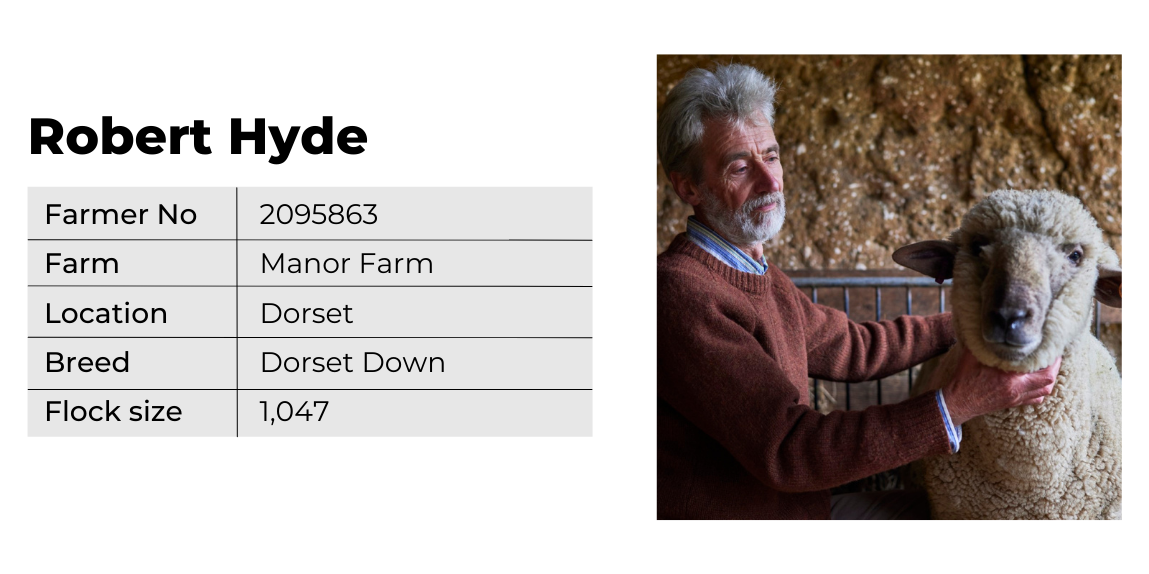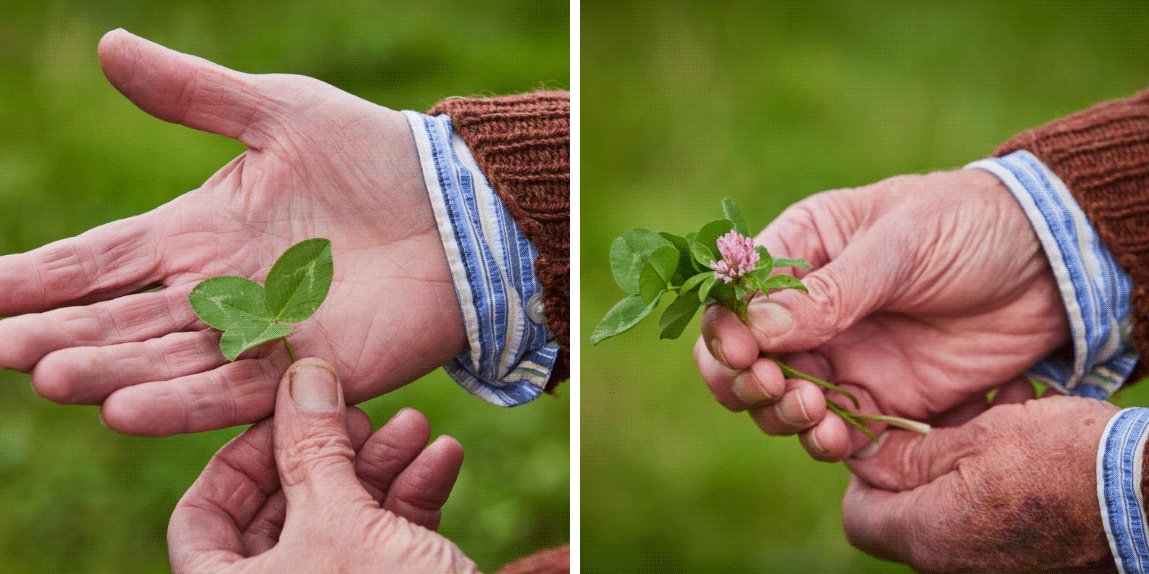
Can you tell us a little about yourself and how long you’ve been farming?
This is a family farm and it's about 800 acres, farming both sheep and arable. We have been entirely organic for over 20 years now. I’m a 5th generation farmer in the family and I have a nephew that will take over the farm once I am unable to keep it running. I live here with my partner and there are two of us who currently work on the farm, myself and my tractor driver. We grow oats and barley and of course rear sheep. Our flock of Dorset Down was established in 1846, it’s probably the oldest Dorset Down flock there is, certainly the largest pure breed flock in existence."
We’d love to know more about your organic farming methods.
I converted to organics in 1999, after making the change I wish I had started 20 years before, it’s so good. I was almost there when I started, I just needed to get certification really. Everything we do is entirely integrated and feeds into itself. We grow Red Clover, which feeds the entire farming system. As well as feeding the sheep, it is nitrogen fixing so it feeds the following cereal crop. The sheep are then eating any of the surplus gains so it’s all connected. We are trying to be totally self-contained, with regards to the sheep and plants that we grow. Producing our own seeds for the cereal crops, our own grass and clovers, own our breeding stock, we haven’t bought a female for the last 120 years (that we know of!) and we haven’t bought a ram for the last 30 years. So we have an entirely closed flock. />
/>
I have to ask, you are a sheep farmer in a village called Wool…
Well it’s actually a corruption of the word ‘Well’, which means spring. There are natural springs around this property and a few up the road. It’s just an area of springs really, but it's a great talking point! I also have an ancestor called Lamb, so it’s almost meant to be that I work with sheep, couldn’t do anything else really could I!What is the difference between organic and non organic sheep farming?
How long have you got?! The basic answer is farming without the use of chemicals. We don’t use pesticides or artificial fertilisers on crops or animals. With the sheep, we try to look very long term all the time to keep the health of the animal to such a point where it can look after itself. So building up their immune systems and keeping them in good health means they can do what they want to do naturally. Rather than creating intensive situations. We belive in slowing everything down in order for them to grow, react and survive. Growing Red Clover that fixes nitrogen into the ground improves the soil structure and it negates, if you use it correctly, the need for using fertiliser. Using this plant means we can build up the nutrients, which also means that the sheep's droppings are also contributing (they are organic as it were), they break down in the soil and it increases the natural balance and health of the soil. Producing a healthy animal with a great immune system means we don’t need to reach for any medicine.Can you tell us more about the sheep and your wool?
The sheep themselves are Dorset Down and they were evolved in the 1920s, not far from here. Some chap decided that this is the type of sheep he would like to produce and cross bred a South Down with a local Ewe of the time. It's a fine wool breed, my father and grandfather always selected the finer wool sheep in our flock, the finer wool sheep, apart from being more weather proof, but there is also a connection between that sheep that have fine wool and sheep that are happier and healthier. We were a finalist for Wool Producer of the Decade in 2000 and Wool Producer of the Year in 1995, it was based on the quality and presentation of our wool and how clean it is. The length of the fibre is also critical, you also want a certain amount of springiness but they are also a wool that is clean, free from plastics, dirt and paint.What does your day look like?
So every morning all the sheep need to be checked to make sure everyone is alright as you never know what can happen over night. Then there is breakfast, phone calls and office work. Then each day's task is usually different, so it could range from getting in a group of sheep to check on their feet, or getting them in to sort out into different groups for scanning or shearing. Moving them into fresh pasture, they need to be moved every 10 days. There is a little way of remembering that ‘No sheep should hear the church bells twice from the same field’. There should be a 3 week break from any sheep being in a field so they get moved to a completely fresh field, this is basically for hygiene and health purposes, it also gives the grass time to grow back as well. There are then small jobs like fencing jobs to do, just everyday jobs. Other jobs around the farm are more seasonal, such as making hay, or harvesting grain, which is of course fed to the sheep as well. Other times of year we are sewing fresh crops, be it grass or cereal crops, this tends to be either in the Spring or Autumn. Of course there is always the chance that the weather is going to be against you so you can’t do certain things on certain days, so you have to put it off until another time. The weather is the biggest factor that we work with that we don’t have control over, and it’s fundamental to what we do. So if it doesn’t rain enough in the summer, the grass will dry up, so nothing for the sheep to eat and if it rains too much in the winter, it gets too soggy and wet. So we have to work with all those natural cycles and that determines what we do each day.So what is your favourite season on the farm?
May time is the best. Winter is behind us, things are growing fast, the days are getting longer and that time of the year there is a general feeling of optimism, you say, this is great and you feel like it’s all going to come right this year. And because with the nature of farming, much of our work happens outside. So with the longer days, you can get much more done. So instead of starting at 6am, you are able to start at 5am, and if you are really pushed for time you can work late into the evening so you can get a lot of work done, which means you are getting somewhere. So we like the spring, the days lengthening and all the natural reasons, which are fundamental to what we do. Doesn’t only make you feel better but you can really get on.Comments
Leave your comment
Your email address will not be published. Required fields are marked*
